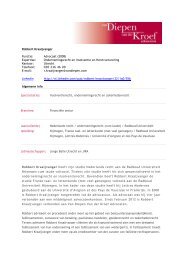© Van Diepen Van der Kroef Advocaten
© Van Diepen Van der Kroef Advocaten
© Van Diepen Van der Kroef Advocaten
- No tags were found...
Create successful ePaper yourself
Turn your PDF publications into a flip-book with our unique Google optimized e-Paper software.
uling of the European Court of Human Rights in Al-Adsani (to which the Association et al.will return below), it is precisely on the point of access to law that there emerges now afundamental divergence between the immunity of states and that of internationalorganisations. That divergence resides in the fact that the court of the state against whichan action is brought (in the case of Al-Adsani/Koewait) has jurisdiction. In the case of aninternational organisation there is no such national court with jurisdiction and that is whyinternational organisations have an obligation un<strong>der</strong> international law to establish a legalremedy. In the case of the United Nations that obligation is laid down in section 29 of theConvention. Where another court has jurisdiction, a court may more quickly come to thejudgment that it lacks jurisdiction (see: <strong>Van</strong> <strong>der</strong> Plas, De taak van the Court en het IPR, p.265). The immunity of a state can in such case be maintained.162. There are certain rules of international law that are so important that in the event of aconflict between them other rules of international law have to yield. This higher form of lawis termed ius cogens. The District Court gives the appearance erroneously and withoutsubstantiation in law that immunity should be a form of ius cogens. The District Court heldthat there was no ground to uphold a hierarchy between different types of ius cogens. TheDistrict Court thereby implied that as a result immunity should be ius cogens. Thatimplication is unsupportable on the basis of literature and caselaw.163. The prohibition on genocide is ius cogens (see J.A. Frowein, Encyclopedia of PublicInternational Law, Volume Three, 1997, page 67). The Association et al. is conscious thatthe UN did not itself commit the genocide. The issue in this regard is the question whetherthe UN failed in its obligation un<strong>der</strong> the Genocide Convention to prevent genocide.There is besides an issue of ius cogens with the violation of other human rights, such astorture, mur<strong>der</strong> and rape. It was foreseeable in July 1995 that all those human rights wouldbe violated when at that time the UN failed in its un<strong>der</strong>taking to provide protection (seefurther numbers 408 through 411 in the writ of summons and the sources cited there).164. For a clear un<strong>der</strong>standing of the issues the Association et al. will address more fully thejudgment of the European Court of Human Rights in the Al-Adsani Case, a case that alsorelates to the interpretation of ius cogens. The plaintiff was a citizen of the State ofKoewait who instituted an action for damages in the United Kingdom against the State ofKoewait alleging responsibility on the part of the State of Koewait for his torture andclaiming damages for the resulting physical and emotional injuries. The legal issue before<strong>©</strong> <strong>Van</strong> <strong>Diepen</strong> <strong>Van</strong> <strong>der</strong> <strong>Kroef</strong> <strong>Advocaten</strong> page 70 of 99
















